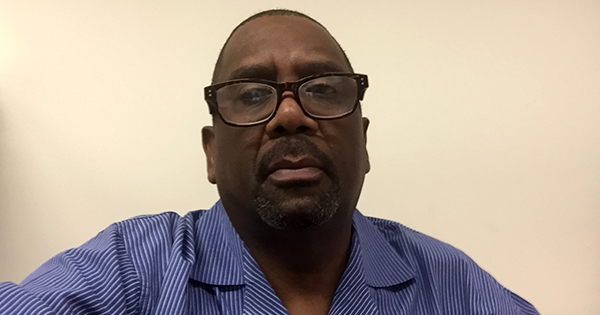By Tolson Banner

Nationwide — Beale Street is anywhere Black USA: rural or urban – where the 24/7 steady drumbeat of Black Lives Matter beat out justice against a pernicious rhythm of “implicit bias and unconscious discrimination”. It is where Red, Black and Green fade into invisibility vis a’ vis the landscape of Red and Blue United White States. It is where the pronouncements of white privilege and white entitlement emanate, as King puts it, “jangling discords of the nation.” This is where movies about race relations – streamed or projected, end the same – rendering spoiler alerts unnecessary. The black protagonist is always faced with insurmountable odds strategically placed by the white antagonist who denies at every turn their nefarious role in the arrested development of Black America.The setting for the movie could very well be any Black USA community where the day is very much like yesterday: killings of unarmed blacks at the hands of noxious police, duplicated by staunch white racists; incarceration of innocent blacks by a rigged judicial system; profiling and arresting blacks for mundane acts of walking, driving, sitting, running, swimming, barbecuing; talking on the phone in a hotel lobby; asking to use the restroom; and simply BREATHING AIR. All charged to the same recurring theme of implicit bias.
This movie opens with a young black couple beginning on the odyssey of their lives, filled with hope and promise, undergirded by LOVE; only to find racism permeating every aspect of their existence. The movie careens its way to where the protagonist is wrongly accused of rape and is later railroaded into taking a plea. At the same time the love of his life is caring for their unborn child, bearing witness to the horrors of inhumanness and transferring her stress, fear, anger and resentment to her baby. You already know the outcome. No spoiler alert here. Black people armed with a flicker of hope and a mustard seed of faith – still go looking for justice!
I noticed upon entering the movie, many seats were filled with whites. I thought to myself how could “they” sit through a movie like this and not be touched? Maybe hope springs eternal. After all, the movie did show some good white folks – two at most. DEAD WRONG! Upon the conclusion of the movie I turned in an awkward manner to engage my fellow white American in some discourse, albeit briefly, to which his reply was just a grin. The same grin Black America gets when we turn to America for open and honest discussions about the nation’s “historical peculiar institutions”: in banking, in housing, in schools, in voting, etc.
The movie reiterated – profoundly – Black America’s imprisonment need not be defined by steel bars alone. Another form of imprisonment, albeit subliminal, is also sprinkled throughout the American language. Let’s see there’s blackmail, black market, black mood, black magic, black hand, black ball and the lists goes on and on until the break of a brand new dawn. The only time black is positive is when it is correlated with capitalism as in BLACK FRIDAY. And that raises another poignant point: If Black enslavement labor was the basis for capitalism, then how in hell can Black people be capitalist? I know – that is a discussion for another time.
If you decide to see the movie in light of no spoiler alerts I would encourage you to view this movie with a different aperture. In a documentary on James Baldwin titled “I Am Not Your Negro,” Baldwin exhorts white America to answer the age old question, “WHY DID WHITE AMERICA HAVE A NEED TO CREATE A NEGRO?” With that in mind your pursuit of the truth should pose questions from a different vantage point. No more should Black America talk about how we overcame or how we can overcome when fellow white Americans continue to obstruct our path on purpose. Whenever a gain is made another form of obstruction pervades. The questions begs why do white folks do what they do to stifle the growth of BLACK AMERICA? Just smiling at questions about race relations is nothing new with White America. A case in point – America refused to participate in the South African Truth and Reconciliation Commission following the alleged end of apartheid. Truth and Reconciliation are two principles America have always just “smiled at”.
The stereotypes created by Hollywood explicitly destroys the beauty of Black America. The beauty of the Black nation is found in our women. With the constant barrage of stereotypes, we find the symbolic black woman always highlighted in public as disheveled, tattered and forlorn. Hair in disarray, skin tone ashy and lacking vibrancy. But every so often, the Hollywood stereotypes are dismantled and what is allowed to shine through is Black America’s humanity: the symbolic Black woman dressed immaculately, hair coiffed and adorned with ivory and pearls; she smells of frankincense and myrrh. Her beauty is alluring, captivating, even mesmerizing. However, the memory of her beauty is fleeting. Akin to the beauty in Black Panther, this beauty is quickly supplanted by another BLAXPLOITATION movie.
In light of the foregoing White America, if Beale Street could talk: “WATDAFUCYOUTHINKITWOULDSAY!” ‘Nuff said.
Tolson Banner is a writer and columnist. Banner was the first African-American Public Information Officer with NASA as a result of the breakthroughs by African-American women captured in the movie “Hidden Figures.” Banner later produced a national syndicated program for the space agency titled, “NASA and YOU” to recruit more African-American engineers. Banner can be reached at: mobilifstyle1@gmail.com or (202) 413-6431.
